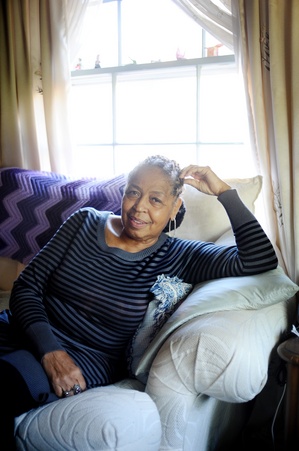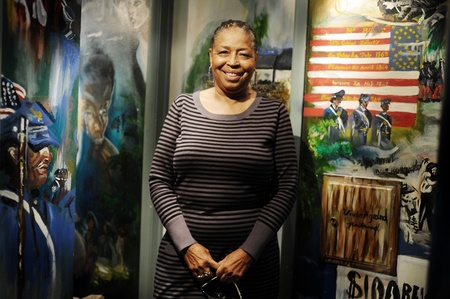Ann Arbor's Elizabeth Allen to appear in History Channel's 'Vietnam in HD'

Elizabeth Allen of Ann Arbor is one of the real-life figures who are a primary focus of an upcoming TV series on the Vietnam War.
Melanie Maxwell | AnnArbor.com
But this wasn’t Allen’s first time in front of a camera. Captain Allen previously appeared on two episodes of, and worked as a consultant for, the ABC drama, "China Beach"; she participated in documentaries about women in war for the National Geographic Channel and The Learning Channel; and most recently, she appeared in Keith Famie’s “Our Vietnam Generation,” which focused on Michigan veterans and premiered earlier this year.
While you might assume that these previous projects brought Allen to the attention of “Vietnam in HD”’s filmmakers, according to her, producer Lou Reda got her name from the Library of Congress.
Allen considered herself a “Johnny come lately” to “Our Vietnam Generation,” but her involvement in “Vietnam in HD” was more in-depth, involving a trip to Pennsylvania for an 8-hour interview.
“They asked questions ... like, ‘What was it like to be an African American woman there?’ And that was very critical for me. Because during the whole of the Vietnam campaign, there were less than 50 African-American nurses there, and that was one of the very difficult things for me, because there was no preparation for me. What I mean by that is, … there was no plan at the front about African-American women being officers and being in a combat zone. There is a military regulation about there being no fraternization between officers and enlisted personnel. Now, that works well for white women, but not for African American women, and so it was the loneliest time in my life. There was nowhere for me to go, no one for me to talk to," Allen said.
"I was in Vietnam when Martin Luther King was killed, and it was a stormy time for troops who were asking, what were we doing there? We weren’t even welcome (in America).”
Despite witnessing the horrors of war firsthand, and struggling with loneliness, Allen nonetheless wanted to serve in Vietnam longer than the one-year maximum that the Army allowed for nurses.
“I did not feel that I would be welcome here, and I wasn’t,” said Allen “People couldn’t come to grips with me.”
Raised in West Virginia, Allen earned her master’s degree in nursing at Ohio State University before joining the Army and asking to serve in Vietnam—a calling that was mostly inspired by her older brother’s service in the Navy. And while both siblings served simultaneously in country, Allen’s older brother didn’t know she was there.
“I believed that even though he was Navy, if I took care of the Army well, somebody would take care of him,” said Allen.
PREVIEW
”Vietnam in HD”
- Who: Ann Arbor's Elizabeth Allen and others who served in Vietnam.
- What: Six-hour series that immerses viewers in the sights, sounds, and stories of the Vietnam War by using footage shot by the soldiers themselves.
- When: 9 p.m. November 8-10.
- Where: History Channel.
Instead, Allen has long worked to draw attention to the grave problems faced by under-served female veterans returning from war; the children of troubled veterans; and veterans who end up homeless or in prison.
"Even the VA has trouble delivering care to women," said Allen. "They're doing better with the Afghanistan group, but they did a very poor job with the Vietnam group of women. Here in Michigan, if you were a licensed registered nurse and got Axis 1 PTSD (Post Traumatic Stress Disorder), then you could lose your license for having a psychiatric disease. So now you're crazy and you don’t have a job. … I have talked to legislators, and they've always said, 'There's nothing we can do about that.' You can do something about it. They just choose not to. These things make it imperative that somebody speaks up, and if it’s not worth it to me, who is it worth it to?
"And in schools, there are groups for kids with alcohol and drug addicted parents, but there's no group for kids of veterans," said Allen. "I speak to that so the kids get support, too. They're in a vulnerable position."
The appearance of new documentaries like “Vietnam in HD” and “Our Vietnam Generation” might seem to suggest that enough time has passed for Americans to have a substantive discussion about a war that deeply divided the nation. But Allen said, “I don’t think that this country is ever going to come to grips with Vietnam.”
One reason for this, Allen argues, is that Vietnam marked the only time in American history when congress passed a bill to draft young men who didn't necessarily meet the criteria for joining the military. So even if some of the War's 350,000 draftees failed tests or had had trouble with the law, they were sent on to fight.

Elizabeth Allen in her Ann Arbor home.
Melanie Maxwell | AnnArbor.com
Two things that are emphasized in Reda's "Vietnam in HD" series is how the war was a battle for body count, not territory; and how U.S. troops were repeatedly asked to do the impossible.
"Always," said Allen. "We ran out of everything all the time. We didn’t have bandages, we ran out of food, the troops ran out of bullets, we ran out of IVs—you were always asked to do the impossible. And one of the funniest stories of all was, when I was at Cu Chi, we got this load of ping pong talbes and volleyballs and volleyball nets, and I thought, 'What the hell is this?' What it was was, the fine ladies of the United States had heard that the U.S. troops were having sex with the local women, and in order to stop that, they needed a diversionary activity. Honest to God. Like, if we had volleyball nets, we’d stop 18-year-old boys from chasing women."
But memories of the War's inevitable absurdities are also, inevitably, linked to far more painful ones—ones that permanently changed the people involved.
“I was a nurse on duty the first night of Tet—an incredibly awful situation," said Allen. "That changes you. You're no longer the person you were. … You've got to walk by yourself through the war part. You don't get to come back from that. You just are never the same. At least there, I was in an environment that I knew, … and I was damn good at what I did. And I could keep doing it, 14, 15, 16 hours a day, because I made a difference. Coming back here, … being black, being female, having a master’s degree, being in the Army, let me tell you—those are all strikes against you, and nobody wants to talk about that. The assumption was that I had to be lesbian. That I had to be ugly or I had to be stupid, and let me assure you, I was not either of those. … I do live here in this country, and I’m not for or against war. But I am always for the warrior.
"We want warriors, but we don’t want to take care of them. We want them to do the dirty work and then come back and be normal, everyday citizens. People think, 'Why don’t they just get over it?' But you don’t get over war. You don't get over holding the hand of an 18-year-old boy who's dying. That doesn’t go away."
Jenn McKee is the entertainment digital journalist for AnnArbor.com. Reach her at jennmckee@annarbor.com or 734-623-2546, and follow her on Twitter @jennmckee.


Comments
daniel gregg
Tue, Nov 8, 2011 : 3:08 p.m.
Thanks for providing a different perspective on the Vietnam war. Like most Vietnam vets, Ms. Allen has given a lot of thought reflecting on her tour as a combat nurse. Highly efficient, calm and duty bound, nurses in Vietnam provided a touch of home for banged up soldiers. Like Ms. Allen, I'm a Vietnam vet with many of the same issues described in her story. I've been back to Vietnam 3 times as part of the D.O.V.E. Fund, (Development of Vietnam Endeavors) with other veterans who had struggled with their experience there decades ago. In our 12th year, the D.O.V.E. Fund has raised funds to build schools, provide scholarships and clean water to needy children. We also are involved in micro-finance programs, help for the blind along with medical and dental care for the most impoverished areas of Vietnam. This is the best way to remember Vietnam. Dan Gregg, Ann Arbor <a href="http://www.dovefund.org" rel='nofollow'>www.dovefund.org</a>
BhavanaJagat
Mon, Nov 7, 2011 : 4:51 p.m.
THE VIETNAM GENERATION : I was part of that Vietnam Generation who had watched the War while I had lived in India. Indians had participated in Vietnam on behalf of the International Control Commission for Vietnam. My Unit Commander, Colonel Iqbal Singh of The Regiment of Artillery, had served in Vietnam. Later, both of us had participated in a military operation in Chittagong Hill Tracts during 1971-72 when Prime Minister Indira Gandhi had initiated the Liberation of Bangladesh. During this military operation, we have used the same military equipment and supplies that American men were using in their Vietnam War. The men of my Unit were trained by American Instructors in the use of their weapons, field gear, signal equipment, medical supplies and even rations. We had inherited the tactics that Americans would use in their combat missions in jungles. Just like the Vietnam War, we fought battles like the U.S. Army while there were no U.S. citizens directly involved. We had accomplished our Military Mission. It really gives me a sense of bitterness to witness the failure of American military effort in Vietnam. United States did not conduct a proper Offensive Operation to dislodge the Enemy. The aerial warfare and the spraying of chemicals did not subdue the Enemy. If my Unit had joined the Vietnam War, we would have taken the War to the Enemy's front door and attack him at the place where he belonged. I was shocked when Dr. Henry Kissinger, the architect of Paris Peace Conference( The Paris Accords, January 31, 1973 ) made a deal with the Enemy and had agreed to remove combatants from Vietnam with no guarantee that the troop withdrawal would be of a great advantage to the Enemy. We too have lost some young men during our military operation. But, I have kept their Spirits alive in my Consciousness and I have named them "The Living Tibetan Spirits." They refuse to die. <a href="http://bhavanajagat.com/2011/09/09/operation-eagle-1971-and-vietnam-war/" rel='nofollow'>http://bhavanajagat.com/2011/09/09/operation-eagle-1971-and-vietnam-war/</a>
Kboogy
Mon, Nov 7, 2011 : 1:45 p.m.
Elizabeth Allen is a wonderful individual that I have had the pleasure of knowing on a personal level for over 20 years. I am so honored to know her and be a part of her life. Her service to this country is phenomenal and I am so elated to see her being recognized for all see has achieved in life!
swimfan
Mon, Nov 7, 2011 : 12:13 p.m.
I had the pleasure of being a student of Ms. Allen. She is an amazing person, educator, and advocate.
David H. Garner
Sun, Nov 6, 2011 : 1:59 p.m.
Thank You for serving, I was also there during Tet,as a ground pounder, and yes it does change you, I lost a best freind, yes he was black, every time the wall comes I visit and still talk to him, and you are so right peaople did not want us back and I'm white, they could care less, I do belive over the last few years things have changed and the attitudes have changed. Again Thank You for serving, if it was not for you many of us would not come back alive.
aataxpayer
Sun, Nov 6, 2011 : 1:29 p.m.
Thank you for your service to our country.